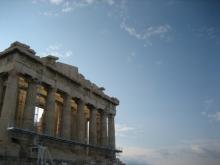Athens, Greece
In a world increasingly dominated by visual media, we live, breath and think visually in a way never really known before in history. How can we create a vocabulary within this milieu that captures and allows for human expression in ways that benefit society? How does "cinematic language" – perhaps the most universal and common language of today’s world - work?
In this program, students explore cinematic language by making an actual feature film. So not only do students return from Greece having experienced a world-renowned culture, but also having contributed to the making of a feature that can leave them with life-long memories as well as professional filmmaking experience.
The students put theory into practice – the goal is to make a feature-length dramatic film and to submit it to recognized national and international film festivals.
The two theoretical approaches that undergird this program are critical theory and work of semioticians like Roland Barthes, as well as the theory of narratives and narratology. Both play important roles in knowing how to acquire and to use the cinematic language.
In addition to these intellectual pursuits, students actively learn all elements that go into the making a modern feature film.
Filming takes place in Athens and in a small rural village on the island of Euboea. Students stay at the Norwegian Institute Guesthouse in Athens and at a private guesthouse in the village. Food and accommodations are included in the costs of the program. Open to all UW students.
Enrollment is limited to 18 students.
Logistics
Students obtain airfare and arrive in Athens on their own. Housing is available the night of January 2nd. Independent travel is possible on weekends. There will be a preparatory pre-departure workshop in autumn that is mandatory for all in the program to enroll.
Student testimonials
"Not only was the travel experience itself life changing, but the people I met in my program also changed my life. I will never forget what an amazing time I had while in Greece."
"I returned to the states with an education that I could never have obtained within the confines of the traditional university setting."
"This program was definitely an eye opening experience. The challenges we faced with our academic research were in the end very rewarding and brought our academic experience to a whole new level. I would recommend this program to everyone."
This program is open to students from all backgrounds. All students are encouraged to apply.
C LIT 397 - Special Topics in Cinema Studies (5 credits)
This course provides the unlocking of the “cinematic language,” which lies at the heart of all film and video production. In fact, any form of visual production. By cinematic language, we refer to the mechanism of translating ideas in visual form – both the content and the way it is framed visually that stimulates a particular way of perceiving and thinking in the viewer. There is no dictionary to provide the “grammar” to the visual language, but through experimentation, shooting and analysis we may begin to break down its elements. We also learn by studying other films.
DRAMA 499 - Undergraduate Research (5 credits)
Students in drama may regard this course as way to prepare for feature film production. It is vital for acting students to be familiar with the principals of filmmaking – montage, editing, on-camera presence and camera movement. But for all students in the program, it is important to develop and become skillful at the principle of putting theory (script) into action (acting). This process can be complicated yet in order for the cinematic language to work, and for drama to be a social activity, it requires learning how theory and action work in tandem.
EURO 111 - Elementary Modern Greek (5 credits)
Credit is given in Modern Greek for the simple reason that you are daily confronted with the Greek culture and the necessity to communicate with others in Greek. We provide a compacted course in Elementary Modern Greek at the beginning of the program. No one expects you to converse with Greeks after such lessons, but we do want you to apply the language skills into a richer cultural experience. Most students who learn Greek appreciate the doors that it opens in the country, and it also forms an important part of the memories you take back from the time you spent there. Also, Greeks do appreciate that you took the time to learn a few words in their language. The language lessons take place in Greece at the Norwegian Institute of Athens for our first week in Athens.
The program fee is $6,700. The Athens program fee will cover instructional costs, tuition, housing, instructional materials including film equipment rental, transportation in Greece, excursions, and some group meals. A $350 deposit, included in the program fee, will be assessed to the student’s tuition account just after the student signs the payment contract.
This program fee does not cover: $250 IPE fee, airfare, meals, insurance or personal travel and expenses.
Make sure to read our Fees, Financing, and Withdrawal page for information on paying for your trip.
